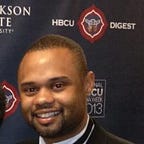By Cutting Programs, Can HBCUs Build Competitiveness?
Is it better to be known for variety or quality? Would you rather stake your business future on a range of people coming for a diverse set of products, or a small group of people who know that a few products will be the best they can get anywhere?
This is the problem many historically black colleges and universities face today, with fast-changing realities in funding, interest and industrial needs throughout the nation and the world. Delaware State University is the latest public HBCU to drop programs in order to streamline costs and increase strength among programs of note, with more than a third of its total offerings coming off-line this fall. From the Delaware News Journal:
Faced with stagnant state and federal funding, the Dover university had to prioritize programs and reallocate resources to better respond to student demand, university president Harry L. Williams said. More than one-fourth of DSU’s $140 million annual budget comes from the state.
“We have to make the decision in the best interest of our students and the taxpayers of Delaware and the best interest of the university as a whole,” Williams said.
HBCUs are desperate to find stable footing in a higher education industry where high-demand programs are more available through predominantly white, historically black, online and community college vehicles. In the four-way fight for state and federal appropriations and creating professional outcomes for students, HBCUs have, for many years, simultaneously fought against the stereotypes of inferiority, and the structural deficits which make the difference in recruiting and retention.
But this is a fight that, in the end, will cost HBCUs the war. The liberal arts remain a critical partner in the development of young minds and professional brilliance. Designing apps, saving lives through public health advocacy and medical intervention, envisioning the future of transportation, national security and technological industry all require creativity and compassion for the human condition. These are the hallmarks of the liberal arts experience.
But will romance languages and other liberal arts courses, without a specific course of influence for the explosion of industry around science, technology, engineering and mathematics help public HBCUs to demand and secure more funding? Will they help to attract students to enroll as standalone degree programs? Can they produce enough graduates who make enough money to give handsomely back to HBCUs?
The answer would seem to be yes, but only if the arts are working in tandem with applied sciences and professional degree programs. There is room for visual artists, but they deserve to learn skills in gaming design and programming, app development, and digital curation. There is room for philosophers and consumer sciences, but moreso if working in tandem with hospitality and business administration.
But there are careful considerations each campus must make. How does program cutting impact our mission to the community? Could we violate accreditation standards by cutting programs or terminating faculty in certain areas? Will alumni and students accept the recommended cuts, even if part of the decision-making progress, or will they create a public relations struggle around the issue? Are we limiting relationships with donors and corporate partners who may have an affinity for some of our underperforming programs?
For Delaware State, which has grown its enrollment over the last three years, the goal is to make great programs into the some of the best in the region and country. That requires a painful sacrifice of some programs which students, not administrators, have determined to be diminished in utility by way of declining enrollment.
It is a model many HBCUs, particularly private schools, should consider as a much needed antidote for bloated salary and benefit budgets, operational costs, and a lack of traction in the local marketplace for high-caliber students and faculty.
